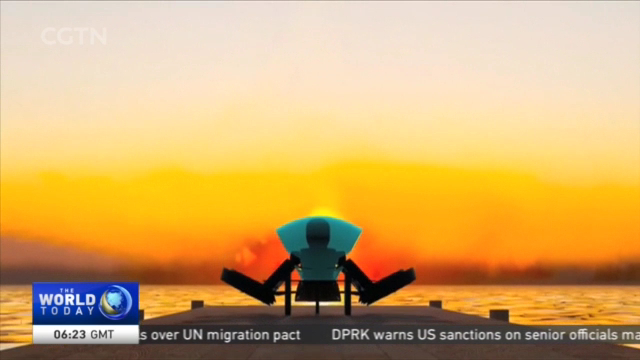
14:45, 17-Dec-2018
Ride that Highway in the Sky: Japan to allocate $40 mln to make flying car come true
Updated
13:57, 20-Dec-2018
03:51

Japan's Ministry of Economy, Trade and Industry has stated plans to allocate about 40 million dollars in its 2019 budget to support flying car technology. It's also organized a task force of companies from across aviation, automotive, and information technology sectors to help Japan catch up to other international flying car competitors. The amount of money is relatively small, but it has focused industry and investors' attention on the race to make flying cars more than a fantasy. CGTN's Steve Ross reports from Tokyo.
An Olympic leap into the future for 2020? But some say, let's be practical, and get the whole family on board.
This summer Japan's Chief Cabinet Secretary Yoshihide Suga announced that the government would launch a public-private council to plot out the practical use of flying cars in hopes of bringing more companies into the effort.
With well developed prototypes already being tested in Europe, the U.S., China and elsewhere, Japan is looking to catch up. Emerging from the score of government-led companies is scrappy start-up "Cartivator".
TOMOHIRO FUKUZAWA CARTIVATOR "Some of the members (are) from airplane companies, some from helicopter companies, some from car companies, and some from drone companies."
Cartivator representative director Tomohiro Fukuzawa leads the team of about 100 flying car enthusiasts, some volunteers, some paid.
Cartivator has received about $375,000 in support from Toyota Motors to get their dreams off the ground. But, Cartivator has a way to go if their "SkyDrive" manned vehicle, still in development, is really to achieve their dream of lighting the Tokyo 2020 Olympics' ceremonial flame cauldron. Fukuzawa says that Cartivator's project extends beyond technology, taking on global transportation rules and norms.
TOMOHIRO FUKUZAWA CARTIVATOR "Mobility itself won't make the city different. For example, infrastructure, or electricity, or many, many things is needed for a flying car world."
TOMOHIRO FUKUZAWA CARTIVATOR "For example, zoning is not only a Japanese problem but also a worldwide problem. So now we and the other countries get together to make new rules, or new infrastructure for better flying car business and a 'flying car world'."
STEVE ROSS TOKYO "While Tokyo's futuristic architecture may look ready-made for flying cars, more safety measures will need to be put in place before flying cars can become a reality for commuters."
Current designs for flying cars are frequently based on drone technology, which lacks the gliding flight stability of wing-based aircraft. Functional failure could result not only in deaths of flying car passengers, but loss of the lives of those on the ground below. Aviation critic and former Japan Airlines pilot Hiroyuki Kobayashi also envisions the arrival of flying cars, with appropriate controls in place.
HIROYUKI KOBAYASHI AVIATION EXPERT "Flying cars can be achieved, but of course regulation is important. Ensuring the safety of flying cars is a requirement for widespread use. Without proper regulation, many accidents will occur."
And that has some critics asking, with the government still hammering out Tokyo's smoking rules in preparation for the 2020 Olympics, what hope is there for a whole new set of rules on flying car safety, insurance, liability, zoning, and training?
HIROYUKI KOBAYASHI AVIATION EXPERT "I think that flying cars have a future and the technology for them will develop more and more. Regulations always follow technology. The key to the success of flying cars is the proper balance of regulations with the technology."
Steve Ross, CGTN, Tokyo.

SITEMAP
Copyright © 2018 CGTN. Beijing ICP prepared NO.16065310-3
Copyright © 2018 CGTN. Beijing ICP prepared NO.16065310-3